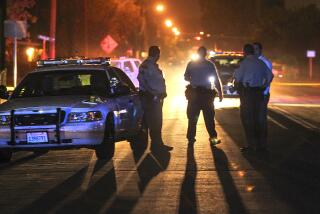Matthew Shepard Case Still a Center of Dispute
- Share via
Re “Justice Shouldn’t Be Tilted by ‘Hate Crimes,’ ” Commentary, Nov. 26: The opinion JoAnn Wypijewski holds is not quite the one she seems to be arguing for. If she wants to show people what effect hate crime laws have on criminal prosecutions, she should probably find a case from a state that has one.
What her article reveals is that it’s not hate crime laws she opposes, it’s sympathy for victims and their families. That may be a defensible opinion, but she shouldn’t use hate crime laws as a cover for it. Wyoming does not have such a law, and what this case reveals is that neither Matthew Shepard’s family nor the citizens of Wyoming really needed one.
The family’s grief and the community’s compassion arose on their own. Wypijewski may think that’s a shame. I don’t.
David Link
Sacramento
*
The issue of hate crimes, or any crime, isn’t just about the results, but also bias against the victim by the legal process after the fact. Wypijewski’s article reveals she has little understanding of the motives for bias crime laws, particularly by this sentence: “What happened in the Shepard case wasn’t justice, but special treatment.” What happened in the Shepard case was that his killers tried to use the “gay panic defense” in a blatant attempt to inflame the judge and jury against the victim.
Shepard’s killers were convicted on multiple felonies -- no hate crime laws are in effect in Wyoming, so such a law was not a part of the court proceedings or sentencing. If Wypijewski doesn’t think that a life sentence for such a murder as Shepard’s isn’t fair, but special, then we still have a long way to go with the principles of bias crimes. Why Shepard was killed shouldn’t matter, and justice should be blind to the fact that he was gay. However, since this subject has come up again, it shows that it clearly does.
Regan DuCasse
Hollywood
More to Read
Sign up for Essential California
The most important California stories and recommendations in your inbox every morning.
You may occasionally receive promotional content from the Los Angeles Times.










